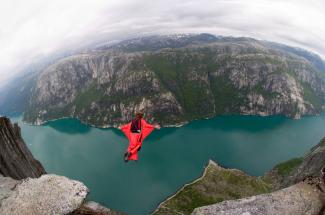
Instructions
Do the preparation exercise before you listen. Then do the other exercises to check your understanding.
Preparation
Do this exercise before you listen. If you don't know the answer, have a guess!
Transcript
Presenter: Welcome to Tech Today! This week it’s National Science and Engineering Week, so to celebrate we asked Jed our science correspondent to give us a round-up of new inventions.
Jed: Hi, yes, I’ve got some very interesting things to tell you about today, starting with a fun one: wingsuits, those suits that look like bats and allow people to fly, or glide, at least. They’re the ultimate in cool.
Presenter: But they’re not very new, are they?
Jed: Well, no, but the modern ones are better than ever and last October was the first ever world championship in China. The price is coming down, too. Now you can buy one for 600 to 2,000 dollars. It’s still too expensive for me, but I suppose it’ll keep coming down.
Presenter: OK, what about useful new inventions?
Jed: There are lots of those. There’s a new solar water distiller created by Gabriele Diamanti aimed at parts of the world where it’s hard to get clean drinking water. You pour in salty water and let the sun do the work for a few hours. Then, hey presto! You have clean water! It’s a very simple device and fairly cheap to produce.
Presenter: Can I hear some doubt in your voice?
Jed: Well, they still need help with investment to start producing the distiller properly. So if anyone out there has money to invest in a great product …?
Presenter: Absolutely. Get in touch with the designers.
Jed: Another useful invention which it would be good to see in production are ‘enable talk gloves’. These were invented by some Ukrainian students to allow people with speech and hearing impairments to communicate with people who don’t understand sign language. The gloves use sensors to translate sign language into text, then into spoken language using a smartphone. A brilliant invention!
Presenter: Yes, that could benefit thousands of people.
Jed: Another useful invention comes from a surprising source, James Cameron, the film director.
Presenter: The Titanic director?
Jed: The very same. Cameron was part of a team, headed by engineer Ron Allum, which designed the Deepsea Challenger Submarine, capable of descending to the lowest parts of the sea, 10 km down. Last year Cameron went down to the bottom of Challenger Deep, the deepest part of the sea in the world. He was the first person to do a solo dive there, and he stayed for three hours, the longest time so far.
Presenter: That sounds impressive!
Jed: Yes. We know so little about what’s at the bottom of the ocean, and it’s important to find out more. OK, so now for something useful in a different way. You know that feeling when you’re trying to get tomato ketchup out of a bottle and it won’t come out, but you’re sure there’s lots more in there?
Presenter: Yeah, of course. It’s really annoying.
Jed: Well, a team of students at MIT, the Massachusetts Institute of Technology, have come up with a new product that you use to coat a glass or plastic bottle, and then what’s inside, hair gel or mustard, or whatever, comes out really easily.
Presenter: So, it saves hours of frustration trying to get stuff out of bottles?
Jed: Exactly. Right, now for my favourite invention. This is really silly, but I love it. It’s a way of producing clouds indoors.
Presenter: Clouds?
Jed: Yes. A Dutch artist has come up with a way of forming perfect, small, white clouds inside. They’re just beautiful. I don’t think you can do it yourself at home yet, though.
Presenter: I don’t think I’d want to.
Jed: Oh, you would if you’d seen the photos. They’re amazing.
Presenter: OK, Jed, thanks for that. We’ll leave you with your head in the clouds and see you again next week!
This audio is for you to practise your listening skills. Some of the information it contains may not be up to date.
Which of these new inventions would you most like to try out?

Comments